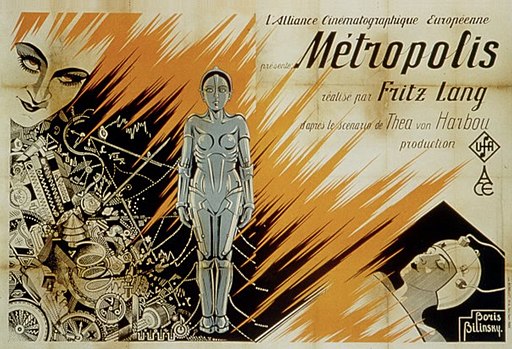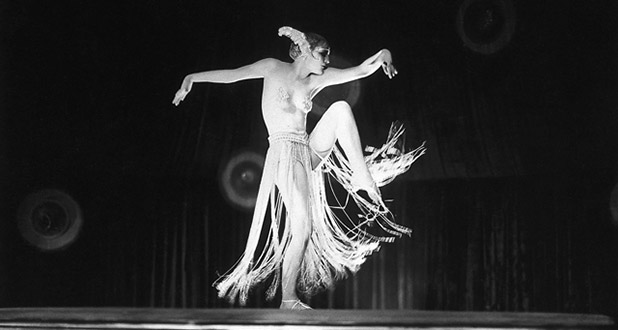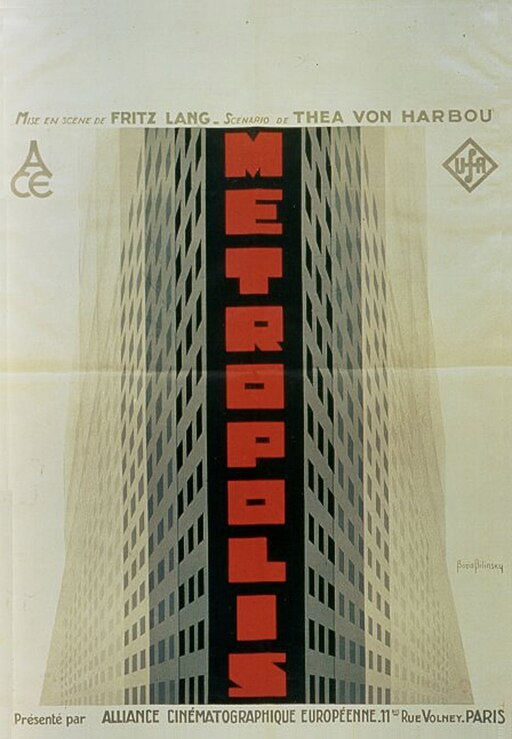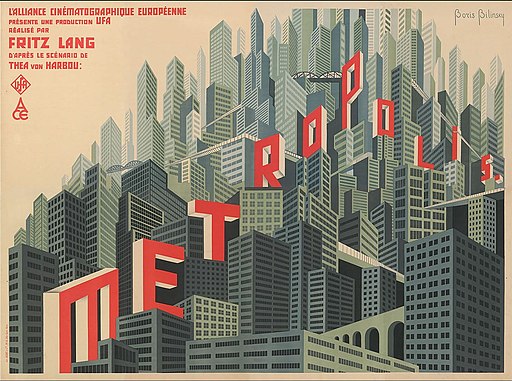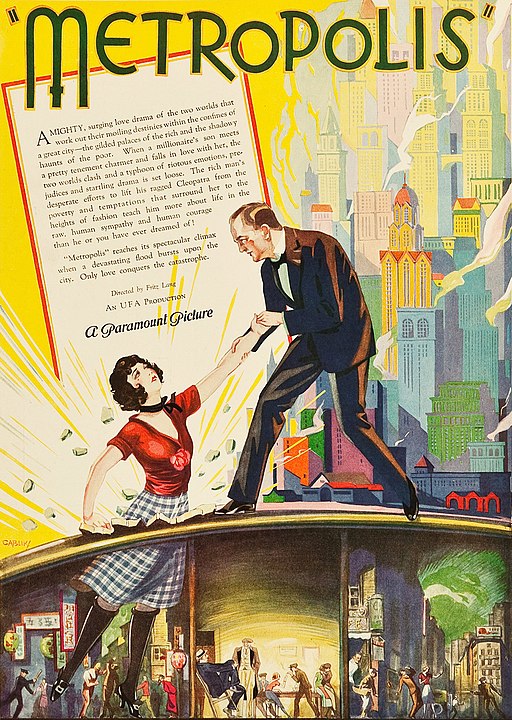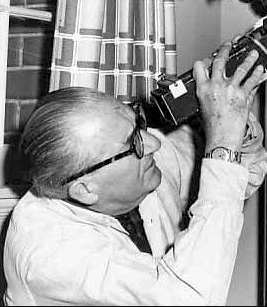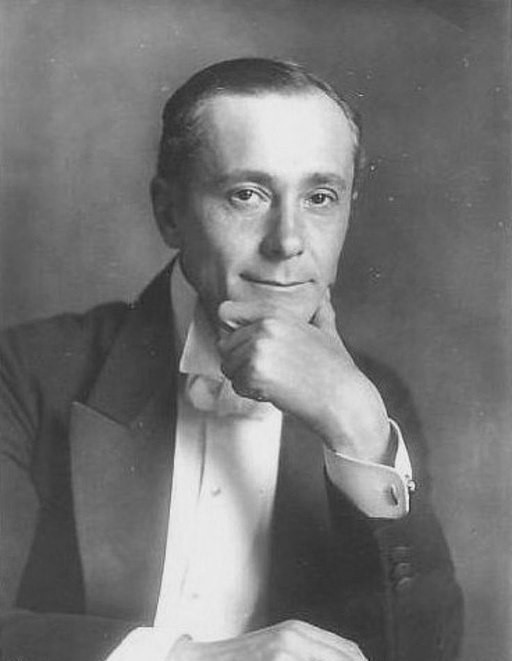Metropolis - 1927
back| Released by | UFA Universum Film AG |
| Director | Fritz Lang |
| Producer | Erich Pommer |
| Script | Thea von Harbou, in collaboration with Fritz Lang |
| Cinematography | Karl Freund, Günther Rittau |
| Music by | Gottfried Huppertz |
| Running time | 153 minutes |
| Film budget | $1,5 million |
| Box office sales | $1,2 million |
| Main cast | Alfred Abel - Brigitte Helm - Gustav Fröhlich - Rudolf Klein-Rogge |
Metropolis
The First Masterpiece of Dystopia
"Metropolis," directed by Fritz Lang in 1927, is a monumental work in the science fiction genre and silent cinema. Set in a futuristic dystopia, it tells the story of a divided society with the elite living in opulence above ground and oppressed workers toiling below.
The film follows Freder, the son of the city's master, as he discovers this inequality and strives to bridge the societal divide, guided by the film's central message: "The mediator between the head and the hands must be the heart."
Notable for its innovative special effects, grandiose set design, and expressionist elements, "Metropolis" had a profound influence on both the aesthetic and thematic development of science fiction in cinema.
Related
Metropolis – 1927
Overview and Analysis
Metropolis" is a visually stunning and thematically complex film that has left an indelible mark on the science fiction genre.
Summary
The film is set in a futuristic urban dystopia, where society is divided into two classes: the wealthy elite who live in luxury above ground, and the oppressed workers who toil below ground to keep the city running.
Plot:
- Introduction: The story begins with Freder, the son of Joh Fredersen, the master of Metropolis. Freder lives a life of luxury but is oblivious to the plight of the workers below.
- Discovery of the Workers' World: One day, Freder encounters Maria, a compassionate figure who works with the children of the workers. Intrigued and smitten, he follows her to the underground city, where he is horrified by the working conditions.
- Joh Fredersen's Plan: Joh learns of an upcoming workers' rebellion led by Maria. He collaborates with the mad scientist Rotwang to create a robotic duplicate of Maria to manipulate the workers.
- The Masquerade: The robot Maria causes chaos by inciting the workers to violence and leading them to destroy the machines, which ironically results in flooding their own city.
- Climax and Resolution: The real Maria is rescued by Freder. They stop the robot Maria, and the workers realize they have been deceived. In the end, Freder acts as a mediator between his father and the workers, symbolizing a hopeful reconciliation.
Analysis
Themes:
- Class Struggle: The film vividly portrays the conflict between the upper class and the laboring class, reflecting the social tensions of the Weimar Republic era in Germany.
- Technology and Dehumanization: "Metropolis" explores the dangers of unchecked technological advancement and industrialization, showing how they can lead to dehumanization and exploitation.
- Mediation and Unity: Freder's role as a mediator proposes that understanding and cooperation between classes are essential for a harmonious society.
Visual Style and Influence:
- Expressionist Aesthetics: The film is noted for its expressionist style, with its use of stark contrasts, geometric designs, and the portrayal of the city as a labyrinthine, overwhelming structure.
- Influential Imagery: The iconic design of the robot Maria has influenced countless representations of robots in cinema and popular culture.
Cinematic Techniques:
- Special Effects: Innovative for its time, including the use of miniatures, the Schüfftan process (a precursor to green-screen techniques), and complex set designs.
- Montage and Symbolism: Lang uses montage editing and symbolic imagery to enhance the emotional impact and to juxtapose the lives of the workers with those of the elite.
Conclusion:
"Metropolis" is a seminal work in the history of film, not only for its groundbreaking visual effects and design but also for its deep engagement with social and philosophical themes. Its influence can be seen in numerous films and works of art that followed, making it a timeless piece of cinema history.
Dance Scene from Metropolis:
Full Cast of “Metropolis”:
- Brigitte Helm as Maria / The Machine-Man (Maschinenmensch): Helm played the dual role of Maria, the compassionate heroine, and her robotic doppelgänger, a pivotal character in the film.
- Alfred Abel as Joh Fredersen: Abel portrayed the master of Metropolis, a powerful figure who oversees the city and its operations.
- Gustav Fröhlich as Freder Fredersen: Fröhlich played Joh Fredersen's idealistic son, who becomes disillusioned with his life of privilege and seeks to bridge the gap between the workers and the elite.
- Rudolf Klein-Rogge as Rotwang: Klein-Rogge played the mad scientist who creates the robot Maria at Joh Fredersen's behest.
- Fritz Rasp as The Thin Man (Der Schmale): Rasp's character is a sinister figure employed by Joh Fredersen to spy on his son Freder.
- Theodor Loos as Josaphat: Loos portrayed Freder's ally, a dismissed employee of Joh Fredersen.
- Erwin Biswanger as 11811 (Georgy): Biswanger played a worker who exchanges identities with Freder.
- Heinrich George as Grot: George played the foreman of the Heart Machine, the central power hub of Metropolis.
Direction of Fritz Lang:
Fritz Lang's direction in "Metropolis" is a testament to his visionary prowess and his mastery of the film medium. His approach to directing this seminal work can be analyzed through several key aspects:
- Expressionist Influence: Lang's direction in "Metropolis" is heavily influenced by German Expressionism, a movement characterized by its emphasis on mood and atmosphere over realism. This is evident in the film's stark contrasts, exaggerated shapes, and the overall otherworldly depiction of the futuristic city.
- Architectural Grandeur: Lang's use of architecture in the film is groundbreaking. The towering skyscrapers, massive industrial machines, and the labyrinthine layout of the city are not just backdrops but active elements in the storytelling, symbolizing various thematic elements like power, oppression, and the industrial machine.
- Pioneering Techniques: Lang pushed the boundaries of what was technically possible in the 1920s. The use of miniatures, the Schüfftan process (a precursor to modern special effects techniques), and complex camera work created a visually stunning and believable futuristic world.
- Integration of Effects: More than just showcasing technical prowess, Lang integrated these effects seamlessly into the narrative. The special effects serve the story, enhancing the thematic depth and the emotional impact of the film.
- Societal Commentary: Lang used "Metropolis" to explore and comment on the social issues of his time, such as class struggle, the dangers of unchecked industrialization, and the loss of humanity in the pursuit of technological advancement.
- Symbolic Imagery: The film is rich in symbolism. The Tower of Babel, the heart machine, and the robot Maria are not just plot elements but carry deeper meanings related to human ambition, the heart of industry, and the fear of technology surpassing humanity.
- Nuanced Characters: Lang's direction brought out complex performances, especially notable in Brigitte Helm's portrayal of both Maria and her robotic counterpart. The characters in "Metropolis" are not mere archetypes; they have depth, conflicting motivations, and undergo significant development.
- Directorial Control: Lang was known for his exacting standards and meticulous control over every aspect of his films. This attention to detail ensured that every performance, every set, and every shot contributed cohesively to the film’s overarching vision.
- Setting Standards: Lang's direction in "Metropolis" set new standards for science fiction and fantasy films. His innovative techniques and storytelling methods influenced countless filmmakers and became foundational in cinematic language.
- Timelessness: Despite being made in the 1920s, Lang's visionary direction makes "Metropolis" resonate even today. The themes he explored and the visual style he employed remain relevant and influential in modern cinema.
Trailer of Metropolis:
Analysis of the Performance of Alfred Abel:
Alfred Abel's portrayal of Joh Fredersen in "Metropolis" is a pivotal element in the film's exploration of power, authority, and the complexities of industrial society. His performance and the character's role in the narrative can be analyzed from several perspectives:
Characterization of Joh Fredersen
- Authority and Power: Joh Fredersen is the mastermind and ruler of Metropolis, a figure of immense power and influence. Abel portrays him as a commanding presence, embodying the authority and control expected of someone at the helm of a vast urban dystopia.
- Emotional Complexity: Abel infuses the character with a nuanced emotional depth. While Fredersen is often cold and calculating, particularly in his interactions with the workers and his subordinates, there are moments, especially concerning his son, Freder, where Abel reveals a more conflicted and vulnerable side.
Performance and Expression
- Subtle Expressionism: In line with German Expressionist cinema, Abel's performance is marked by its intensity and the subtle use of facial expressions and body language. He conveys Fredersen's authoritative demeanor through a commanding posture, deliberate movements, and a piercing gaze.
- Contrast with Other Characters: Abel's portrayal is in stark contrast to the other characters, particularly his son Freder and the workers. While Freder is portrayed as empathetic and idealistic, Joh Fredersen is more detached and pragmatic, highlighting the film’s central theme of class divide and the moral complexities of power.
Thematic Representation
- Representation of the Elite Class: Fredersen symbolizes the industrial elite, the ruling class that benefits from the exploitation of the workers. Abel's performance encapsulates the detachment and disregard this class has for the suffering of the working class.
- Conflict and Transformation: Throughout the film, Fredersen undergoes a transformation. Initially, he is portrayed as unyielding and unempathetic, but as the narrative progresses, particularly through the challenges and changes brought by his son, Abel subtly portrays Fredersen's gradual realization of the consequences of his actions.
Interaction with Other Characters
- Relationship with Freder: One of the most critical aspects of Abel's role is his interaction with his son. This dynamic is central to the film's narrative, exploring themes of familial conflict, generational differences, and the eventual reconciliation.
- Manipulation and Control: Abel's Fredersen is a master manipulator, particularly evident in his interactions with the scientist Rotwang. This aspect of his character highlights the moral ambiguities and the lengths to which he is willing to go to maintain control over Metropolis.
Brigitte Helm as the Metropolis Robot:
The robot in Fritz Lang's "Metropolis" is one of the film's most iconic and enduring elements. Known as the Maschinenmensch (German for "machine-human"), this robot has a significant role in both the narrative and the visual impact of the film. Here are some key aspects:
- Design and Appearance: The robot's design is strikingly futuristic, especially for the 1920s. It has a humanoid form with a distinctly mechanical appearance, featuring a sleek, metallic surface. The design was innovative and ahead of its time, influencing how robots and androids would be portrayed in science fiction thereafter.
- Creation and Role in the Plot: In the film, the robot is created by the scientist Rotwang, who initially intends it to be a resurrection of his lost love, Hel. However, it's co-opted by Joh Fredersen, the master of Metropolis, to impersonate the film's heroine, Maria. The robot's role is to sow discord among the workers and disrupt Maria's efforts to bring about reconciliation between the workers and the elite.
- Symbolism: The robot symbolizes several themes central to the film, such as the fear of technology surpassing human control and the idea of replacing human elements with mechanical ones. Its transformation into the likeness of Maria also touches on themes of identity, deception, and the manipulation of masses through technology.
- Portrayal by Brigitte Helm: The robot was portrayed by actress Brigitte Helm, who also played the human Maria. Helm's performance, both as the compassionate Maria and the cold, mechanical robot, is a highlight of the film.
- Cultural Impact: The Maschinenmensch has become a seminal figure in the history of cinema and science fiction. Its design and concept have influenced countless representations of robots and artificial intelligence in media and popular culture.
- Restoration and Legacy: The robot, along with the rest of "Metropolis," has been subject to various restorations over the years. The rediscovery of lost footage and the restoration of the film in 2010 further solidified the robot's place in the annals of cinematic history.
The Metropolis robot is not just a character in the film; it's a symbol of the merging of humanity with technology, a theme that remains ever-relevant. Its legacy endures as a testament to the film's visionary approach and its lasting impact on the genre.
Memorable Quotes on the Title Cards:
"Metropolis," being a silent film, conveys its story through intertitles (on-screen text) rather than spoken dialogue. However, these intertitles contain some significant and memorable quotes that encapsulate the film's themes and its narrative essence. Here are a few key quotes:
- "The mediator between the head and the hands must be the heart!"
This is perhaps the most famous quote from the film, epitomizing its central message about the need for empathy and understanding to bridge the gap between the ruling class (the head) and the working class (the hands).
- "Deep below the earth's surface lay the workers' city."
This intertitle sets the stage for the stark contrast between the lives of the workers and the elite, highlighting the class divide that is central to the film.
- "Workers of Metropolis - the machines must run smoothly!"
This quote reflects the dehumanizing attitude towards the workers, who are seen merely as cogs in the vast machinery of the city, reinforcing the theme of exploitation and industrial dehumanization.
Awards and Recognition:
"Metropolis," directed by Fritz Lang and released in 1927, is a pioneering work of science fiction and cinema. However, it's important to consider the context of its release when discussing awards and nominations. During the 1920s, many of the major film awards that are prominent today, like the Academy Awards (Oscars), did not exist. The first Academy Awards ceremony, for instance, was held in 1929, two years after the release of "Metropolis."
As a result, "Metropolis" did not receive contemporary awards or nominations in the way modern films do. However, its critical reception and impact over the years have been significant:
- Retrospective Recognition: Over the decades, "Metropolis" has been recognized retrospectively by various film institutions and critics for its artistic and technical achievements.
- Restorations and Re-releases: The various restorations and re-releases of "Metropolis" have often garnered attention and acclaim, highlighting the film's enduring significance in cinema history.
- Influence on Filmmaking: The film is often cited for its influence on the science fiction genre and is considered a landmark in cinematic history. It has inspired countless filmmakers and has been referenced in numerous works across different media.
- Place in Film History: "Metropolis" is frequently included in lists of the greatest films ever made, a testament to its enduring impact and importance.
- Cultural and Historical Significance: The film has been designated as culturally significant by various film preservation institutions. For example, in 2001, UNESCO inscribed "Metropolis" in the Memory of the World Register, recognizing its historical, cultural, and aesthetic significance.

